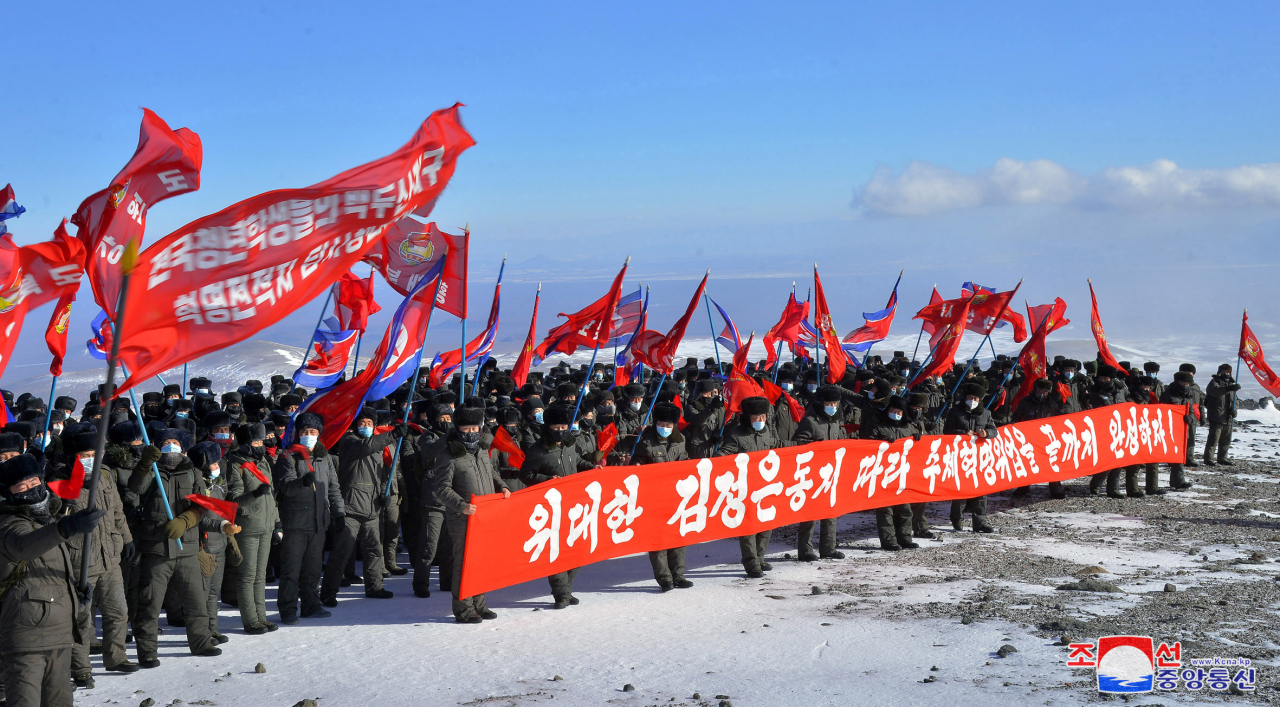N. Korea tightens discipline as economic crisis deepens
By Choi Si-youngPublished : Dec. 11, 2022 - 16:59

North Korea is ramping up its propaganda campaign to increase popular support for the country’s pursuit of a “socialist utopia,” a self-sufficient economy that its leader Kim Jong-un says will be delivered despite international sanctions placed over his nuclear weapons program.
The isolated country has suffered tougher sanctions from the United Nations and United States since January 2016, when it carried out a nuclear test. In 2017 and 2018, the economy contracted 3.5 and 4.1 percent, respectively. The COVID-19 pandemic extended negative growth in 2020 and 2021, separately at 4.5 percent and 0.1 percent, according to the latest Bank of Korea data.
In an attempt to boost morale among North Koreans amid the growing economic crisis, Pyongyang on Sunday announced that a brigade of young North Koreans had climbed and toured Paektusan -- a mountain on the North Korea-China border that is considered sacred. The mountain is a centerpiece of Pyongyang’s campaign to sanctify the ruling Kim family and rally North Koreans behind the “infallible leader.” Previous ruler Kim Jong-il was born there, according to the regime’s mythology.
“The brigade revisited the revolutionary achievements made by Kim Jong-il, the supreme leader, who had dedicated all his life to making revolutionary ideologies of Kim Il-sung the very principles that guide this country,” the state-run newspaper Rodong Sinmun said, referring to Kim Jong-un’s father and grandfather, respectively. Kim Il-sung was North Korea’s founding leader.
The tour “reinvigorated the faith” North Koreans had in bringing about a land built on socialist ideals, the state newspaper noted, describing the event as “the tradition” pushing the country forward.
Meanwhile, the unprecedented frequency of North Korea’s missile launches this year alone has prompted the international community to step up efforts to curb Pyongyang’s nuclear ambitions. This week, nuclear envoys from South Korea, the US and Japan will meet in Jakarta, Indonesia, to discuss concrete measures. The three-way coalition is bringing Seoul and Tokyo closer than ever, as they seek to work out their differences over historical disputes -- the latest of which involves compensating Koreans forced to work for Japan companies during World War II.
The trilateral coalition is also increasingly seeking to rein in North Korea’s cybercrimes. Last week, South Korean authorities warned businesses against inadvertently hiring IT staff from North Korea who mask their true identities and take advantage of remote opportunities to skirt international sanctions and earn cash -- an important source for the North’s nuclear and missile programs.
Such IT workers have become a bigger part of North Korea’s longstanding campaign to alleviate its economic isolation by using foreign remittances from its overseas workers, the advisory said. Information on how North Koreans landed jobs and whether companies that hired them suffered any real damage was not made public. In May, the US said rogue North Korean freelancers seeking jobs for global IT companies pretended to be from South Korea, Japan or other Asian countries, in a separate advisory.


![[Exclusive] Korean military set to ban iPhones over 'security' concerns](http://res.heraldm.com/phpwas/restmb_idxmake.php?idx=644&simg=/content/image/2024/04/23/20240423050599_0.jpg&u=20240423183955)

![[Graphic News] 77% of young Koreans still financially dependent](http://res.heraldm.com/phpwas/restmb_idxmake.php?idx=644&simg=/content/image/2024/04/22/20240422050762_0.gif&u=)



![[Pressure points] Leggings in public: Fashion statement or social faux pas?](http://res.heraldm.com/phpwas/restmb_idxmake.php?idx=644&simg=/content/image/2024/04/23/20240423050669_0.jpg&u=)










